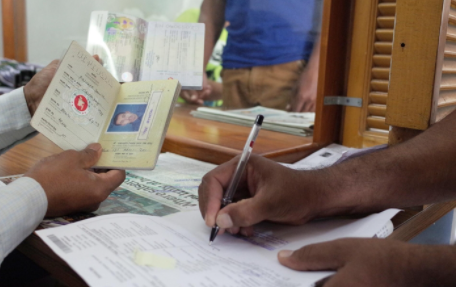Officials said some jobseekers stayed on beyond the amnesty in the hope of finding work
Embassies on Sunday urged their citizens to ensure their UAE residency visas were valid, because the grace period to renew had ended.
Officials said some people with expired visas had ignored the amnesty and stayed on in hope of finding a job.
Indian officials, who represent the largest expat population, said they were on hand to help with repatriation flights for those who found themselves in trouble and had not come forward.
Residents of all nationalities whose visas expired between March 1 and July 11 had until Saturday to renew them. This would include residents who lost their jobs during that period.
Those who did not will start to rack up daily fines from Monday, October 12.
Staying in the country on an expired residency visa would lead to a Dh25 a day fine, with a further daily Dh20 penalty for failing to renew their Emirates ID, costing a total of Dh315 per week. An extra Dh250 is paid when they leave the country.
There is a separate system for those on expired tourist visas, who are hit with Dh200 for the first day, and Dh100 a day after that.
Kofi Mumuni, from the Ghanaian consulate in Dubai, said the majority of its residents took advantage of the amnesty and have left for their home country.
But some chose to stay in the hope of finding work.
“In our case, most of the people who were left jobless due to Covid-19 have returned home,” he said.
“There are a few that have overstayed and not made use of the amnesty in the hope that the job market will change and they will find new employment.
We have not had any people present to the embassy looking for help to return home since the last repatriation flight in August.
“In our experience, people choose to stay in the country, even if on an expired visa, because it is a better reality than returning home where there is little work.”
The grace period was brought in to ensure people who lost their jobs as a result of the pandemic were not burdened with visa fines.
Neeraj Agrawal, a spokesman at the Indian consulate in Dubai, said people need to follow the law.
“We’d like to advise our community members to regularise their visas and residency status,” he said.
“If not, they should leave the country.
We have had many people approach the consulate with help to repatriate.
“To date, those wanting to get local visas regularised have not come to us for help.”
The grace period, which was announced on July 10, was introduced by the Federal Authority for Identity and Citizenship to support those affected by the Covid-19 outbreak.
Many residents who were made redundant or let go from their jobs were unable to leave the country because of several factors, including border closures.
The decision meant they were able to stay in the UAE until October 11 without facing the usual fines for those overstaying on expired visas.
Mr Agrawal said there should be no reason why people who fell within the guidelines of the amnesty continue to remain on an expired visa.
Last week, the UAE government said that it would start re-issuing work permits for some overseas workers.
The decision came seven months after the UAE halted all new overseas work permits in March to limit the spread of Covid-19.
Government departments and semi-public sector firms, which are part-owned by the government, were given the green light to advertise vacancies to external candidates in vital sectors, including health care and transport.
Recruiters in the country hailed the move and said it would help kick-start the job market again, which was badly affected by the pandemic.



